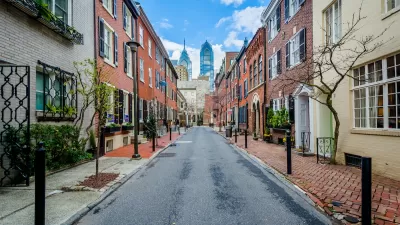It's been radio silence from Philadelphia Mayor Jim Kenney since the City Council approved a dedicated stream of funding for affordable housing.

In June, the Philadelphia City Council approved a construction tax to generate funding for affordable housing. With a 9-8 vote, the approval was three votes short of a veto-proof margin.
Now, nearly two months later, Mayor Jim Kenney Has not indicated his plans for the legislation, and the deadline for a signature, September 13, is rapidly approaching.
Inga Saffron reports on what's known about the construction tax's current state of limbo:
Jim Engler, the mayor’s new chief of staff, insists the administration is merely using the summer recess to study the legislation, but Kenney has made no secret of his distaste for the proposal, which uses a tax on market-rate construction to pay for subsidized housing. Housing advocates are convinced he will use his veto power for the first time since taking office in 2016 to kill the measure, and they’ve started a social media campaign to ratchet up the pressure. Still, a high-ranking elected official told me, “I’d be really shocked if he doesn’t veto it.”
Saffron continues to present both sides of the case for creating this new tax in Philadelphia, and places it in context of other housing-related policies in the city, such as a forthcoming comprehensive housing strategy [pdf] and the city's beleaguered property tax abatement program. Saffron expresses reservations about how the new tax might complicate efforts to reform the property tax abatement program.
FULL STORY: Philly Council spent a year on an affordable housing plan. What if Mayor Kenney vetoes it?

Alabama: Trump Terminates Settlements for Black Communities Harmed By Raw Sewage
Trump deemed the landmark civil rights agreement “illegal DEI and environmental justice policy.”

Planetizen Federal Action Tracker
A weekly monitor of how Trump’s orders and actions are impacting planners and planning in America.

The 120 Year Old Tiny Home Villages That Sheltered San Francisco’s Earthquake Refugees
More than a century ago, San Francisco mobilized to house thousands of residents displaced by the 1906 earthquake. Could their strategy offer a model for the present?

In Both Crashes and Crime, Public Transportation is Far Safer than Driving
Contrary to popular assumptions, public transportation has far lower crash and crime rates than automobile travel. For safer communities, improve and encourage transit travel.

Report: Zoning Reforms Should Complement Nashville’s Ambitious Transit Plan
Without reform, restrictive zoning codes will limit the impact of the city’s planned transit expansion and could exclude some of the residents who depend on transit the most.

Judge Orders Release of Frozen IRA, IIJA Funding
The decision is a victory for environmental groups who charged that freezing funds for critical infrastructure and disaster response programs caused “real and irreparable harm” to communities.
Urban Design for Planners 1: Software Tools
This six-course series explores essential urban design concepts using open source software and equips planners with the tools they need to participate fully in the urban design process.
Planning for Universal Design
Learn the tools for implementing Universal Design in planning regulations.
Clanton & Associates, Inc.
Jessamine County Fiscal Court
Institute for Housing and Urban Development Studies (IHS)
City of Grandview
Harvard GSD Executive Education
Toledo-Lucas County Plan Commissions
Salt Lake City
NYU Wagner Graduate School of Public Service





























